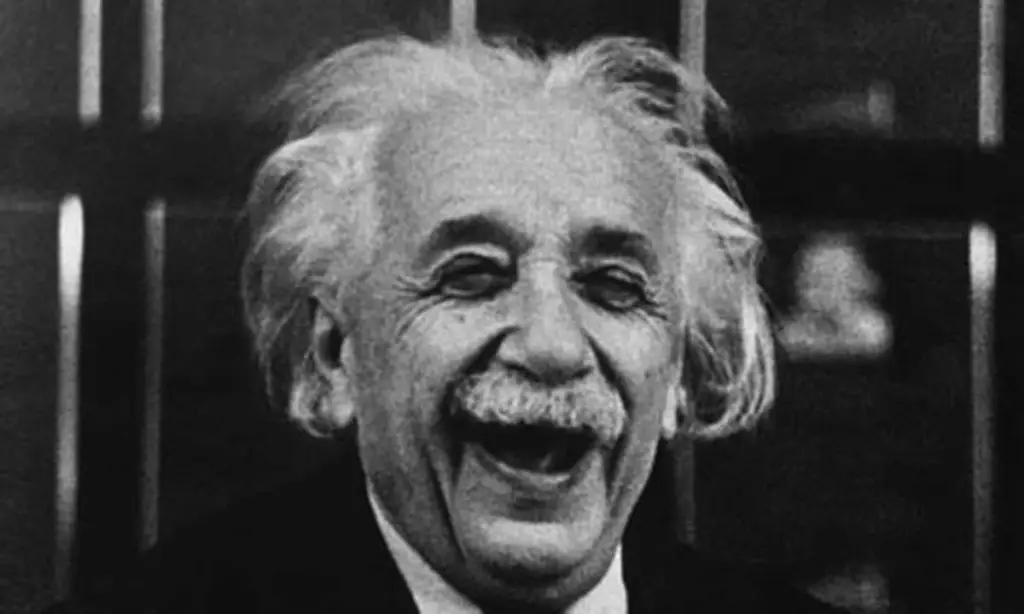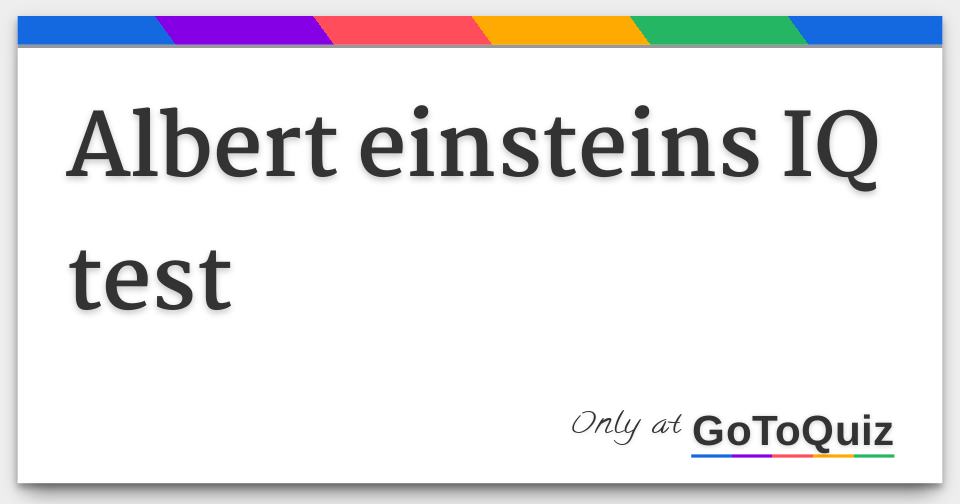The intellectual prowess of Albert Einstein has captivated the world for generations. Recognized as one of the most brilliant minds in history, his groundbreaking contributions to science have profoundly influenced human knowledge. But what was the true measure of his intelligence, and how did it shape his revolutionary discoveries? Let's embark on a journey to explore the extraordinary intellect of Albert Einstein and uncover the essence of his genius.
For decades, Albert Einstein’s name has been synonymous with brilliance and innovation. From his revolutionary theory of relativity to his profound insights into the nature of space and time, Einstein's work continues to inspire scientists and thinkers across the globe. His intellectual capacity, often quantified by his IQ, has intrigued scholars and enthusiasts alike, sparking endless curiosity about the mind behind such monumental achievements.
This article aims to delve into the remarkable intellect of Albert Einstein, focusing on his IQ and its profound impact on his groundbreaking contributions to science. By examining his intellectual capabilities within the broader context of his life and work, we can gain a deeper understanding of the genius that defined an era and continues to shape the modern world.
Read also:The Heart And Soul Of The Walking Dead A Comprehensive Look At Andrew Lincoln
Life and Legacy of Albert Einstein
Before we explore the specifics of Albert Einstein's IQ, it is essential to understand the man who became a symbol of genius. Born on March 14, 1879, in Ulm, Germany, Albert Einstein displayed an early fascination with mathematics and physics, which would later become the foundation of his extraordinary achievements. His journey from a curious child to a world-renowned scientist is a testament to his relentless pursuit of knowledge and his unparalleled intellectual capabilities.
Early Years and Educational Journey
Albert Einstein's early years were marked by a profound curiosity about the mysteries of the universe. Encouraged by his parents, Hermann and Pauline Einstein, he was provided with the resources to nurture his intellectual growth. Below is a table summarizing key aspects of his early life:
| Aspect | Details |
|---|---|
| Full Name | Albert Einstein |
| Date of Birth | March 14, 1879 |
| Place of Birth | Ulm, Germany |
| Parents | Hermann and Pauline Einstein |
| Education | Swiss Federal Polytechnic (ETH Zurich) |
Einstein's education at the Swiss Federal Polytechnic in Zurich was instrumental in shaping his intellectual journey. It was during his time at this prestigious institution that he began to develop the foundational ideas that would later revolutionize modern physics, laying the groundwork for his future achievements.
Unpacking IQ: A Comprehensive Overview
To fully appreciate Albert Einstein's IQ, it is crucial to understand the concept of IQ itself. IQ, or Intelligence Quotient, is a standardized measure of cognitive abilities, including problem-solving, logical reasoning, and comprehension. While IQ is not the sole determinant of intelligence, it provides valuable insights into an individual's intellectual capacity and potential for academic and professional success.
Core Components of IQ
- Problem-solving skills: The ability to analyze complex situations and devise effective solutions.
- Logical reasoning: The capacity to think critically and draw conclusions based on evidence and logical principles.
- Verbal comprehension: The ability to understand and effectively communicate through language.
- Mathematical ability: Proficiency in numerical reasoning and problem-solving using mathematical concepts.
These components collectively contribute to an individual's overall IQ score, offering a comprehensive assessment of their cognitive strengths and areas for development.
Albert Einstein's Estimated IQ
Despite widespread interest, there is no definitive record of Albert Einstein's exact IQ score. However, estimates place his IQ between 160 and 180, placing him among the most intellectually gifted individuals in history. His ability to conceptualize complex theories and solve intricate problems is a testament to his extraordinary cognitive abilities and intellectual prowess.
Read also:Hdhub4u Bollywood Hindi Movies Your Ultimate Guide To Streaming And Downloading
Factors Contributing to Einstein's Exceptional IQ
- Exceptional problem-solving abilities: Einstein demonstrated an unparalleled capacity to analyze complex problems and devise innovative solutions.
- Deep understanding of abstract concepts: His work often involved exploring abstract ideas, such as the nature of space, time, and gravity, which required advanced cognitive abilities.
- Unconventional thinking: Einstein's approach to problem-solving was characterized by his willingness to think outside the box, challenging established norms and exploring new possibilities.
Einstein's unique approach to problem-solving and his ability to think abstractly were key factors in his high IQ and his groundbreaking contributions to science.
The Theory of Relativity and Its Connection to IQ
Albert Einstein's theory of relativity remains one of his most significant contributions to science. This revolutionary theory fundamentally transformed our understanding of space, time, and gravity. The intellectual rigor and cognitive abilities required to develop such a complex theory highlight Einstein's exceptional IQ and his profound understanding of the universe.
Key Concepts of the Theory of Relativity
- Special relativity: This aspect of the theory focuses on the relationship between space and time, demonstrating that they are interconnected and relative to the observer's frame of reference.
- General relativity: Expanding upon special relativity, general relativity explores the effects of gravity on space and time, providing a comprehensive framework for understanding the universe's structure and behavior.
These concepts, developed through rigorous mathematical and logical reasoning, underscore Einstein's ability to think abstractly and conceptually, further demonstrating the depth of his intellectual capabilities.
Einstein's Enduring Influence on Modern Science
Albert Einstein's impact on modern science extends far beyond his theory of relativity. His groundbreaking work has influenced numerous fields, including cosmology, quantum mechanics, and astrophysics. The intellectual depth and breadth of his contributions are a testament to his remarkable IQ and his profound understanding of the universe.
Fields Shaped by Einstein's Work
- Cosmology: Einstein's theories have provided the foundation for modern cosmology, enabling scientists to explore the origins and evolution of the universe.
- Quantum Mechanics: Although Einstein was skeptical of certain aspects of quantum theory, his work laid the groundwork for many key developments in this field.
- Astrophysics: His insights into the nature of space, time, and gravity have significantly advanced our understanding of astrophysical phenomena, such as black holes and gravitational waves.
Scientists continue to build upon Einstein's discoveries, expanding our knowledge of the universe and addressing some of its most profound mysteries.
Addressing Myths and Misconceptions About Einstein's IQ
Over the years, several myths have emerged regarding Albert Einstein's IQ. One of the most persistent misconceptions is that he failed mathematics as a child, a claim that has been thoroughly debunked by historical records. By examining these myths and separating fact from fiction, we can gain a more accurate understanding of Einstein's intellectual capabilities and the true nature of his genius.
Common Myths Debunked
- Failed mathematics: False. Historical records clearly indicate that Einstein excelled in mathematics from an early age.
- Had a photographic memory: Unproven. There is no credible evidence to support the claim that Einstein possessed a photographic memory.
- Was a child prodigy: Partially true. While Einstein displayed exceptional intellectual abilities, his early development was not entirely consistent with the traditional image of a child prodigy.
By addressing these myths, we can appreciate Einstein's genius more fully and recognize the complexities of his intellectual journey.
Lessons from Einstein's Intellectual Journey
Albert Einstein's life and work offer valuable lessons for aspiring scientists and thinkers. His dedication to intellectual curiosity, his willingness to challenge established norms, and his ability to learn from failure serve as inspiration for future generations. By embracing these principles, we can unlock our own potential and contribute meaningfully to the advancement of knowledge.
Key Takeaways
- Pursue knowledge with passion and curiosity, exploring new ideas and challenging conventional wisdom.
- Challenge established norms and embrace unconventional thinking to unlock innovative solutions.
- View failure as a learning opportunity, using setbacks as stepping stones toward success.
These principles, exemplified by Einstein's approach to science, continue to guide researchers and innovators worldwide, inspiring them to push the boundaries of human knowledge.
Societal Impacts of Einstein's Work
Albert Einstein's contributions to science have had a profound impact on society. From technological advancements to philosophical debates about the nature of reality, his work has shaped the modern world in countless ways. The intellectual legacy of Einstein's IQ extends far beyond the confines of academia, influencing diverse fields and inspiring countless individuals.
Societal Impacts
- Advancements in technology: Einstein's theories have paved the way for numerous technological innovations, from GPS systems to nuclear energy.
- Philosophical debates on the nature of reality: His work has sparked profound philosophical discussions about the nature of time, space, and the universe itself.
- Global recognition of scientific achievements: Einstein's groundbreaking discoveries have elevated the status of science in society, fostering greater appreciation for scientific inquiry and its societal benefits.
These impacts underscore the enduring relevance of Einstein's work in contemporary society, highlighting its transformative influence on both scientific and cultural landscapes.
Conclusion
In conclusion, Albert Einstein's IQ remains a subject of fascination and admiration, reflecting the extraordinary intellectual capabilities that defined his life and work. His groundbreaking theories and discoveries have left an indelible mark on human history, shaping the modern world and inspiring future generations. By exploring his life, work, and legacy, we gain a deeper appreciation for the brilliance that continues to influence science and society today.
We invite you to share your thoughts and insights in the comments section below. Engage with our community and explore other articles on our website to deepen your understanding of science and innovation. Together, let's celebrate the genius of Albert Einstein and the enduring legacy of his remarkable intellect.
Table of Contents
- Life and Legacy of Albert Einstein
- Unpacking IQ: A Comprehensive Overview
- Albert Einstein's Estimated IQ
- The Theory of Relativity and Its Connection to IQ
- Einstein's Enduring Influence on Modern Science
- Addressing Myths and Misconceptions About Einstein's IQ
- Lessons from Einstein's Intellectual Journey
- Societal Impacts of Einstein's Work
- Conclusion


